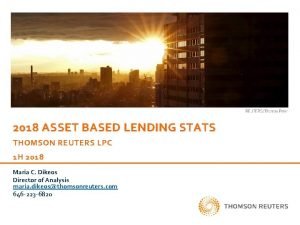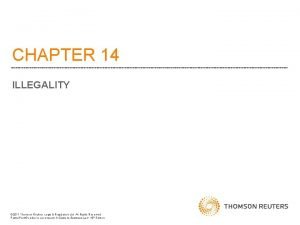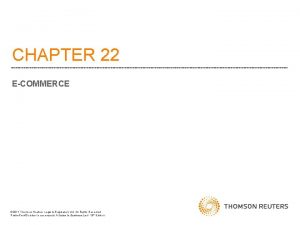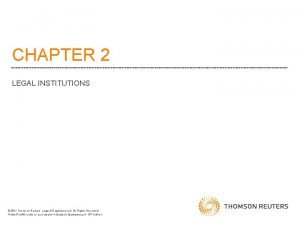CHAPTER 11 CONSIDERATION 2011 Thomson Reuters Legal Regulatory







- Slides: 7

CHAPTER 11 CONSIDERATION 2011 Thomson Reuters Legal & Regulatory Ltd. All Rights Reserved. Power. Point slides to accompany A Guide to Business Law, 19 th Edition

WHAT IS CONSIDERATION? Consideration is something of value done or promised by one party in exchange for something done or promised by the other. It may consist of: • a promise for a promise • an act for an act • a promise for an act • an act for a promise Money is the most common example of consideration 2011 Thomson Reuters Legal & Regulatory Ltd. All Rights Reserved. Power. Point slides to accompany A Guide to Business Law, 19 th Edition

EXECUTED AND EXECUTORY CONSIDERATION • Executory consideration has yet to be performed. Traditionally it is an act or promise not yet carried out. • Once a promise or act has been performed, the consideration is said to be executed. • A contract can be partly executed and partly executory – eg one party has completed their side of the bargain. 2011 Thomson Reuters Legal & Regulatory Ltd. All Rights Reserved. Power. Point slides to accompany A Guide to Business Law, 19 th Edition

RULES FOR CONSIDERATION 1. It is normally required in every simple contract 2. It must be supplied by the person who wants to sue for breach of contract 3. It need not be adequate (market value): Chappell v Nestle 4. It must be definite (not uncertain or vague) 5. It cannot be unlawful (illegal) 6. It may be “present” or “future” (but not in the “past”): Roscorla v Thomas 7. It must be sufficient at law – ie it has some legally recognised value 2011 Thomson Reuters Legal & Regulatory Ltd. All Rights Reserved. Power. Point slides to accompany A Guide to Business Law, 19 th Edition

WITHHOLDING LEGAL ACTION A promise not to pursue legal action may amount to sufficient consideration: • if the legal claim is reasonable; and • the person making the promise has a fair chance of success in their claim. 2011 Thomson Reuters Legal & Regulatory Ltd. All Rights Reserved. Power. Point slides to accompany A Guide to Business Law, 19 th Edition

THE RULE IN FOAKES v BEER • The rule is that a promise to accept a lesser sum in satisfaction of a debt is not enforceable. Exceptions to the rule: The promise is binding if: - the promisor promised to pay the lesser sum at a time earlier than originally promised; - the promisor promised to pay the lesser sum at a place different to that originally promised; - the promisor promised to pay the lesser sum and to do something else; or - there is an estoppel. 2011 Thomson Reuters Legal & Regulatory Ltd. All Rights Reserved. Power. Point slides to accompany A Guide to Business Law, 19 th Edition

PROMISSORY ESTOPPEL • If you look closely at the doctrine you will note two familiar words: PROMISE and STOP. • Basically, promissory estoppel is an equitable remedy that will stop a person who has made some promise from going back on that promise because it would be very unfair or unjust to allow them to do so. • Promissory estoppel is an exception to the rules about consideration as equity may apply it even where there is no contract or in cases where consideration may not have been supplied (Waltons v Maher) • Promissory estoppel is covered in more detail in Chapter 15 2011 Thomson Reuters Legal & Regulatory Ltd. All Rights Reserved. Power. Point slides to accompany A Guide to Business Law, 19 th Edition











